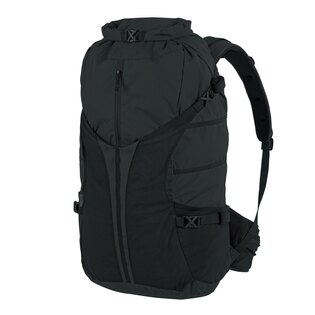Review: Backpack Summit Helikon-Tex
Here is the promised review of the Summit backpack from the Polish brand Helikon-Tex! It is a medium backpack with a capacity of 40 liters and a top-loading chimney construction. How did it perform in the mountains and during military occupations? What might interest you about it? And does it have any disadvantages? Read our tester's notes!
In the previous article, you had the opportunity to read 7 main criteria for choosing a medium backpack for both mountains and work. Based on these criteria, our tester selected the Summit backpack from the well-known Polish company Helikon-Tex on the Rigad.cz site. How satisfied was he with it? Let's dive into the assessment!
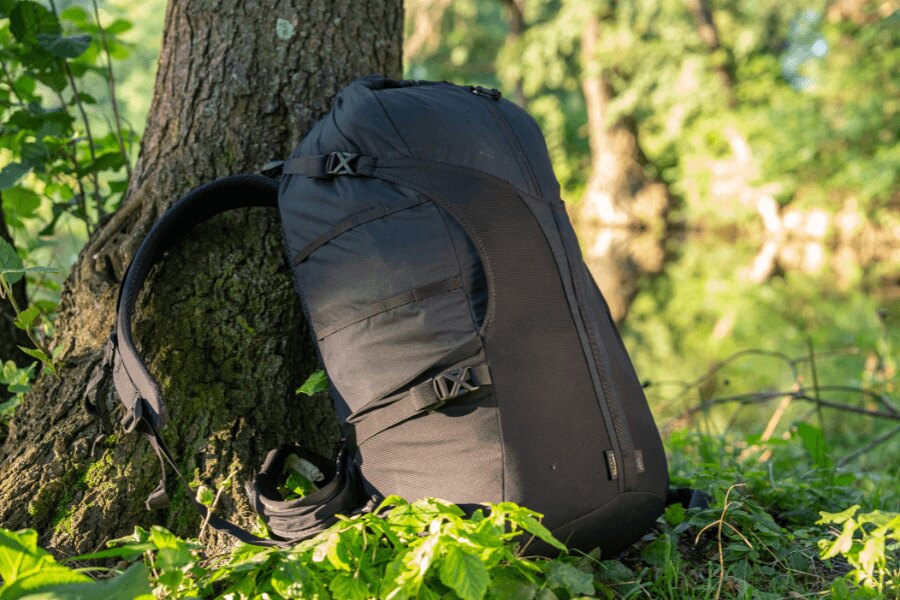
Summit backpack from Helikon-Tex with a capacity of 40 l will serve well both in the mountains and at work.
How do I rate Helikon-Tex products?
I would start by mentioning that this is a product from Polish brand Helikon-Tex. I am extremely satisfied with the products from this manufacturer, both military and outdoor equipment. All products, whether it's backpacks, pouches, or clothing, are well-thought-out and perfected in detail. If something is lacking, Helikon-Tex makes an upgrade in the next product generation. The materials they use are of high quality and seem to last through anything. Moreover, their products are not expensive. Let's face it - the guys from Poland really know what they're doing.
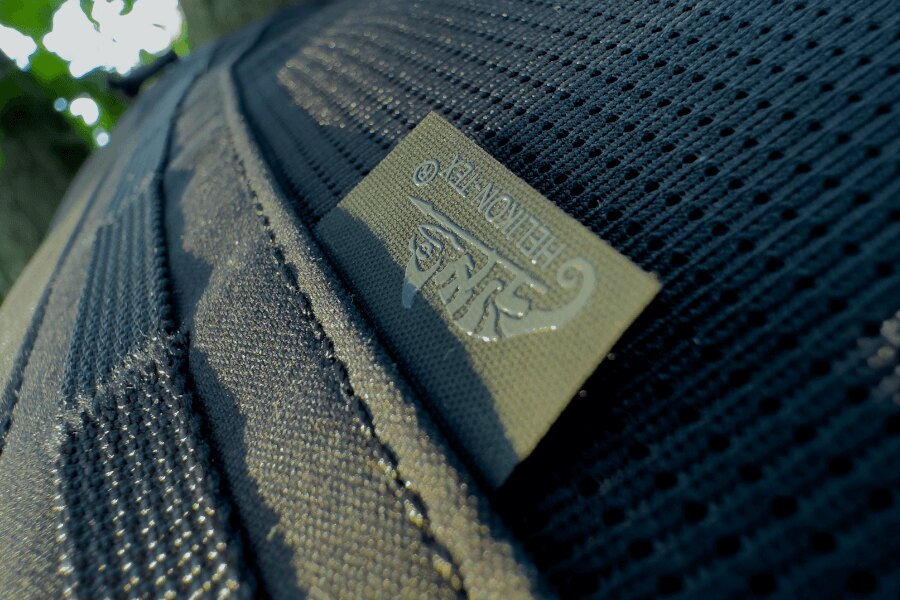
Products from the well-known Polish brand Helikon-Tex are meticulously detailed.
And now let's move on to the review!
1. Capacity, construction, and appearance
Summit is a medium-sized backpack with a volume of 40 liters, chimney construction with top loading. Exactly what I wanted. In addition, compared to other forties I had the opportunity to try, it seems much more spacious, yet visually smaller. It gives the impression that the manufacturer was inspired by Hermione Granger's handbag.
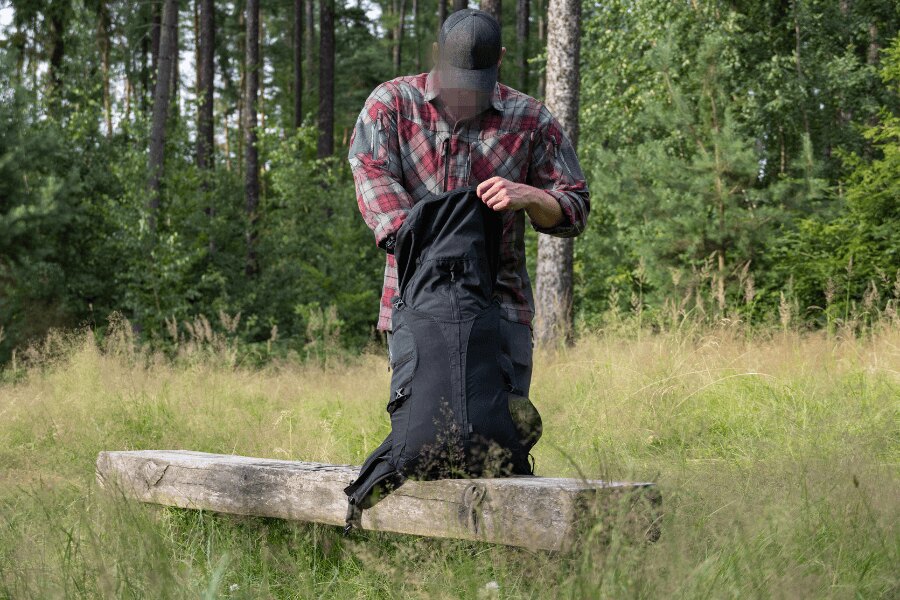
Backpack Summit Helikon-Tex with a capacity of 40 l has a chimney design with top loading.
- The main compartment closes in the same way as the above mentioned Gossamer backpack.
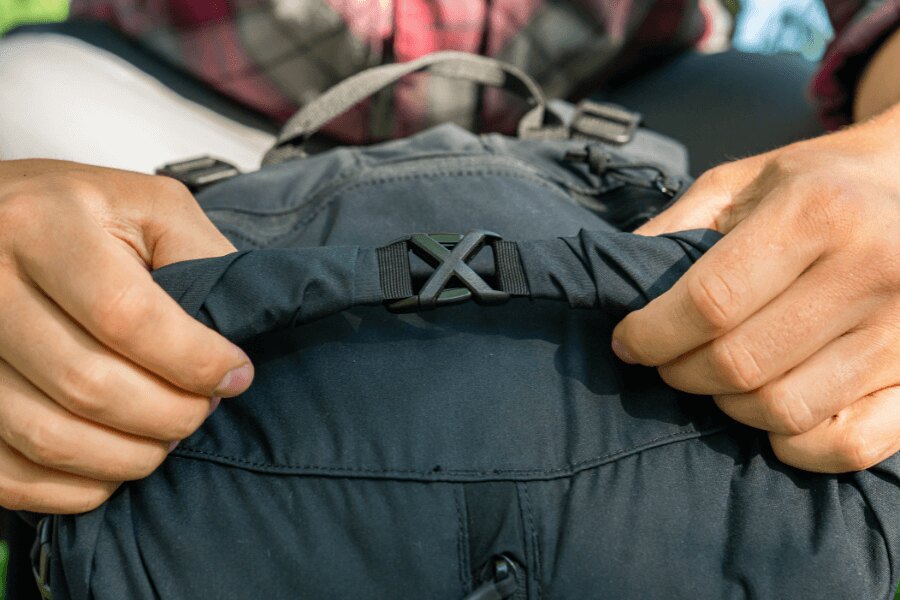
Backpack Summit Helikon-Tex has a roll-up closure system with a fastex buckle - with a small feature in the form of a hidden velcro lock.
- Helikon-Tex has further upgraded this system with a small gadget in the form of a velcro fastener.
- In addition, the backpack contains the element I was looking for, which is a central zipper for the possibility of frontal access to the things I keep inside the backpack. It's not as great as Mystery Ranch, but it's more than enough for its purpose.
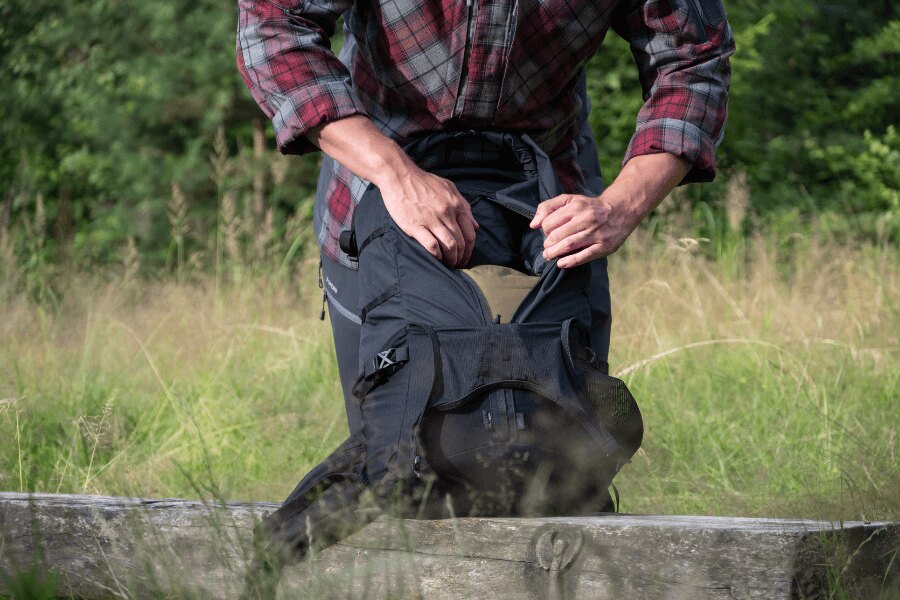
One of the advantages of the Summit Helikon-Tex backpack is the central zipper, which allows front access to the main compartment.
As for the appearance, it also met my expectations. Although it is from the Helikon-Tex workshop, the military origin, in which the manufacturer mainly specializes, is almost unnoticeable. Of course, color will play a big role here. Coyote or both versions of green will always look more military.
2. Back system and shoulder straps
I was very curious about this one and it was also decisive in my choice. It is so extremely simple, it's perfect (at least for my back). You will find only shoulder straps permanently attached to the backpack, and the only adjustment option is using tightening and stabilizing straps. These are again simple, so you don't have to worry about adjusting them to the correct position.
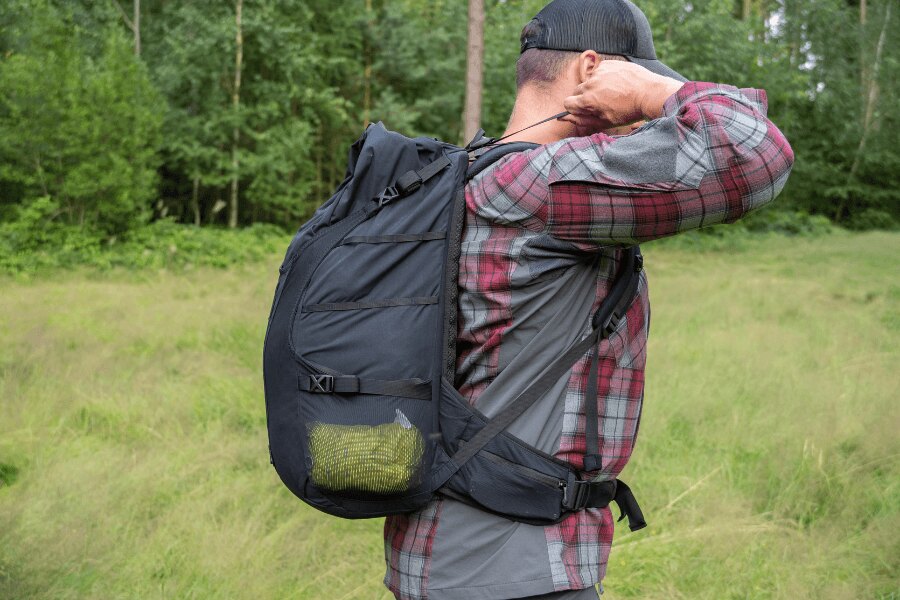
The shoulder strap system of the Summit Helikon-Tex backpack is extremely simple but functional.
Shoulder straps are padded with sufficiently firm foam and covered with 3D mesh (it is coarse, but does not chafe even on a bare neck). On the shoulder straps, there is a height- and length-adjustable chest strap with an elastic part and a fastex buckle fastening.
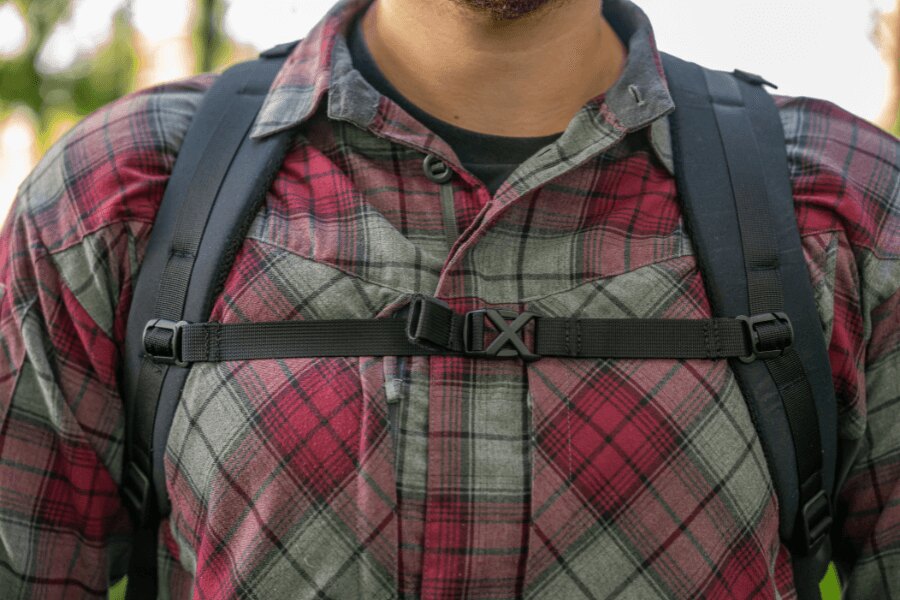
Adjustable chest strap of the Summit Helikon-Tex backpack with fastex buckle.
The back system of the backpack itself is made from ribbed foam and is covered with the same 3D mesh as the shoulder straps. In the middle of the back, there is a cutout for better sweat wicking and it also serves as a spacer to the spine. Thanks to this, the backpack doesn't pinch anywhere and fits really well on the back. The heat management here is a bit worse (like with most backpacks with non-ventilated backs). But even so, it is sufficient.
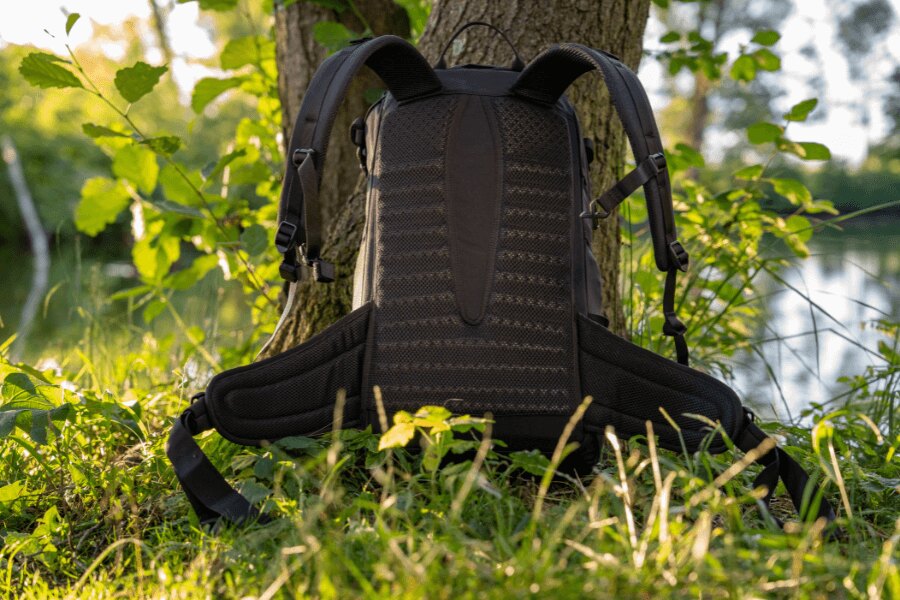
The back system of the Summit Helikon-Tex backpack is made of ribbed foam with 3D mesh.
The back system is further reinforced with a foam insert that is hidden in the back part of the main compartment and can be removed. Thanks to this insert, the backpack is pleasantly soft when worn, and once you adjust everything as needed, the foam insert shapes itself to your back. After that, the backpack doesn't tend to move around on your back and is really comfortable to wear.
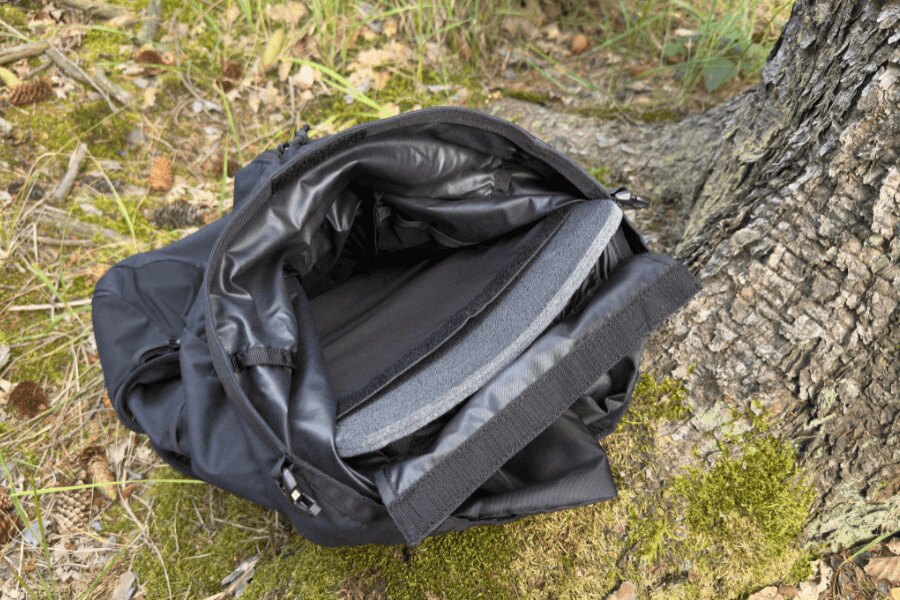
The back system of the Summit Helikon-Tex backpack is reinforced with a removable foam insert.
3. Hip belt
The hip belt of the backpack is firmly sewn on and cannot be folded or detached. The only option to hide it, if you do not want to use it, is to fasten it around the front side of the backpack. The belt is pleasantly stiff, lightly padded, and again covered with 3D mesh. It is sufficiently long, and when tightened, you can roll its loose ends into the elastics that are on both ends.
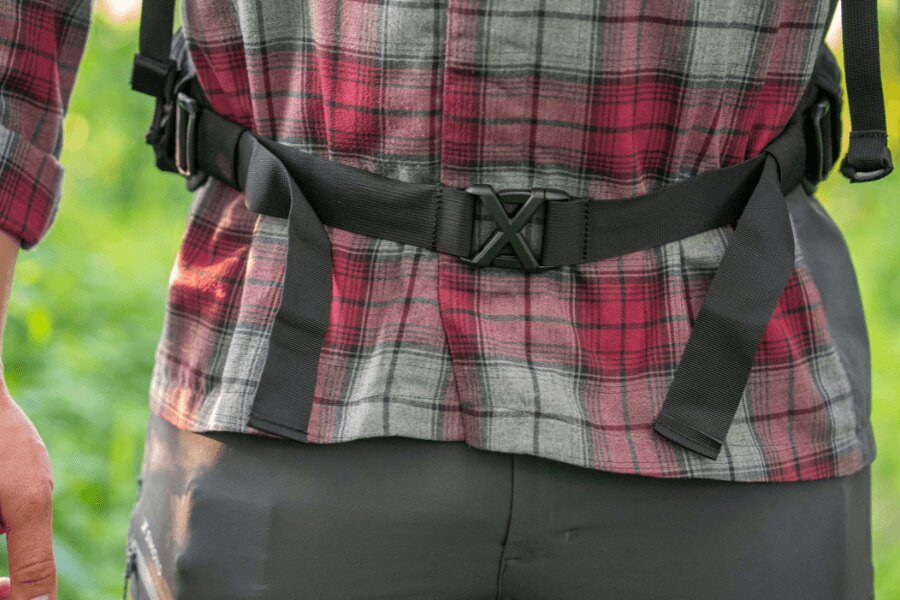
The hip belt of the Summit Helikon-Tex backpack is not removable.
The fastening is managed using a large lightweight fastex buckle and the length adjustment is counter-directional. On both sides there are spacious zippered pockets made of stretchy mesh material, which can accommodate an iPhone 15 Pro Max. So I even got the mentioned bonus here :)
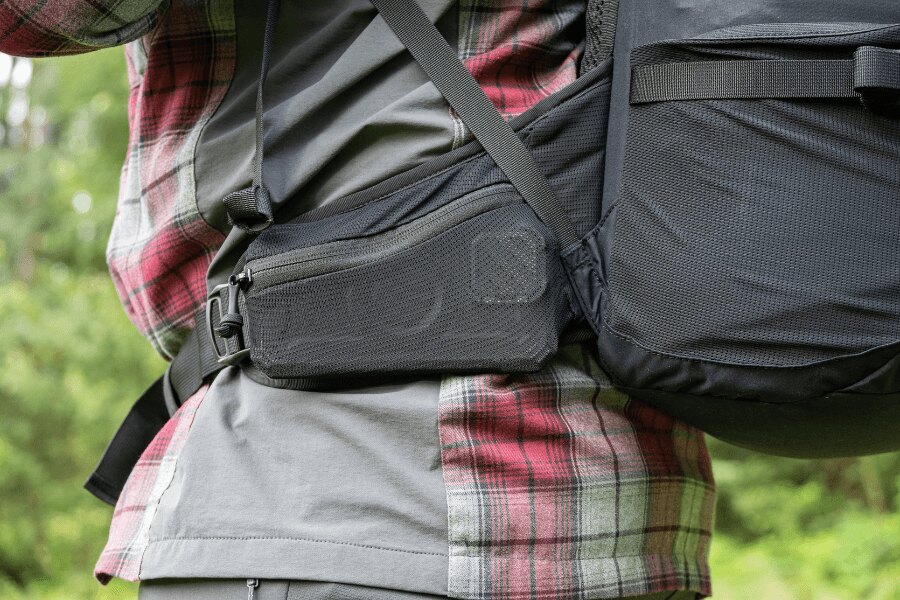
On both sides of the waist belt of the Summit Helikon-Tex backpack, you will find practical zippered pockets.
4. Structure - outer side
The outer side of the backpack is smooth, and you will find several great features on it. At first glance, you will notice a spacious pocket made of elastic material. This is suitable, for example, for storing a jacket or items you want to have quickly at hand. I mainly use it for a groundsheet under my sleeping mat, which also serves as a seat pad. The pocket is firmly sewn to the bottom part of the backpack and closes with two fastex fasteners on the top, which are adjustable in length.
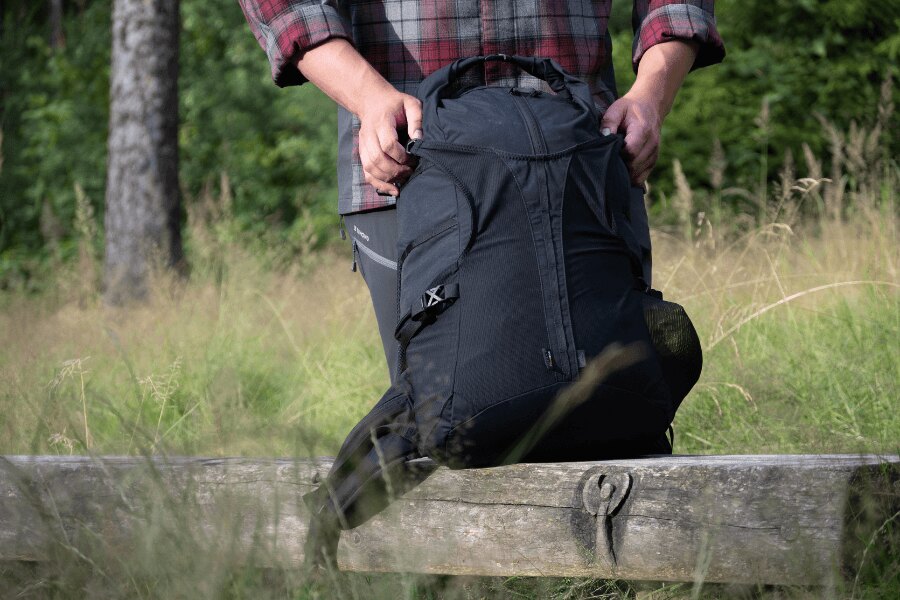
On the front side of the Summit Helikon-Tex backpack, the spacious pocket made of elastic material will capture your attention first.
Under this pocket, you will find the aforementioned central zipper for access to the main compartment. If you need to unzip it all the way down, you have to detach the pocket. It's a bit inconvenient, but on the other hand, it serves as a backup in case the zipper breaks.
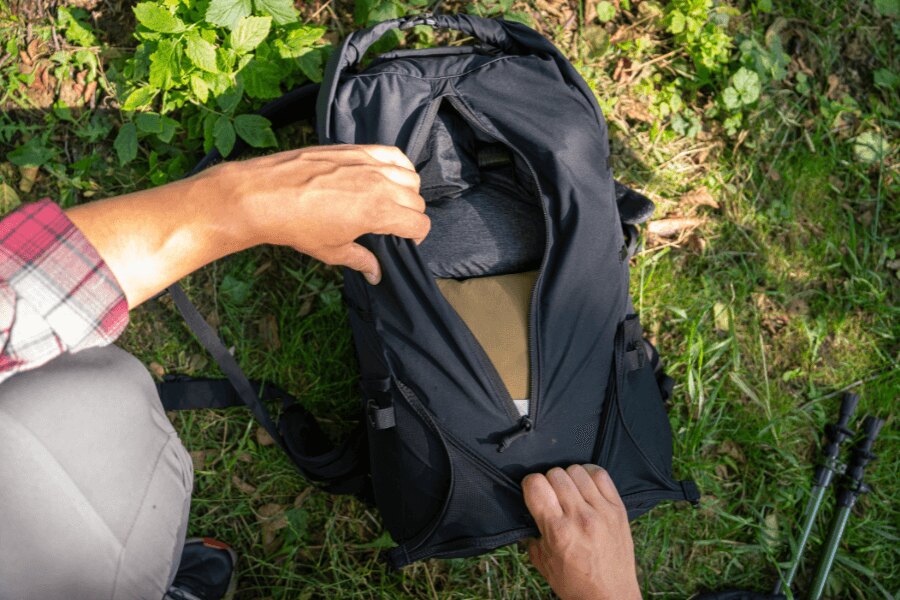
Center zipper in the front part of the Summit Helikon-Tex backpack.
On the outside of the pocket, you will also find a vertical strip of thin molle, where you can attach something like a carabiner.
On both sides of the backpack, there are elastic bottle pockets. They are made from the same material as the large front pocket and can comfortably accommodate a one-liter Nalgene, a tripod, or trekking poles.
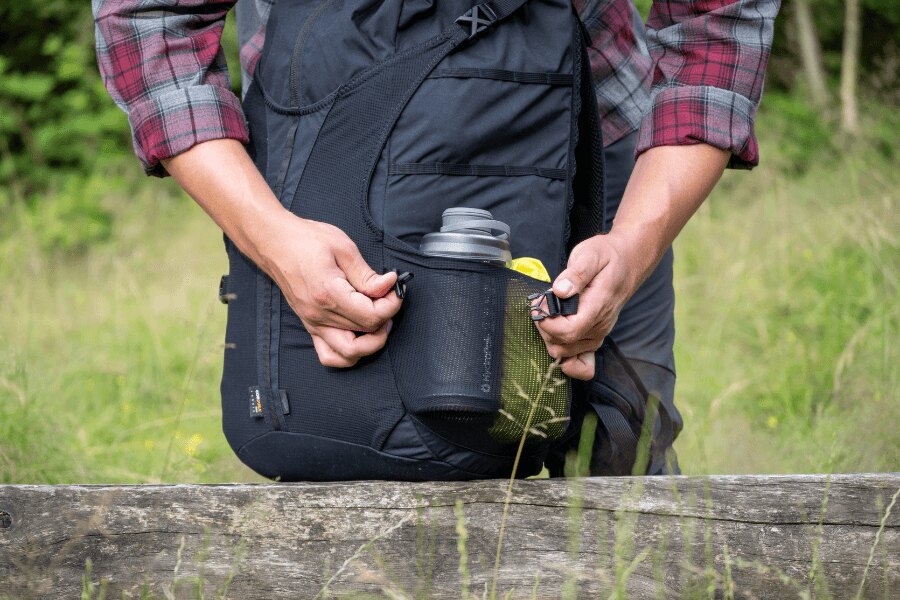
Elastic bottle pockets, which can be found on the sides of the Summit Helikon-Tex backpack, are secured with fastex buckles.
The pockets are secured with fasteners, which also serve as compression straps to reduce the overall volume of the backpack and allow you to attach a sleeping mat or a small tent to the side. Above them, you will also find two rows of thin molle.
5. Sections - top and bottom side of the backpack
Top side
On the top side, you will find only four things
- access to the main chamber,
- a small pocket for small items,
- hole for the hydration hose,
- carrying handle.
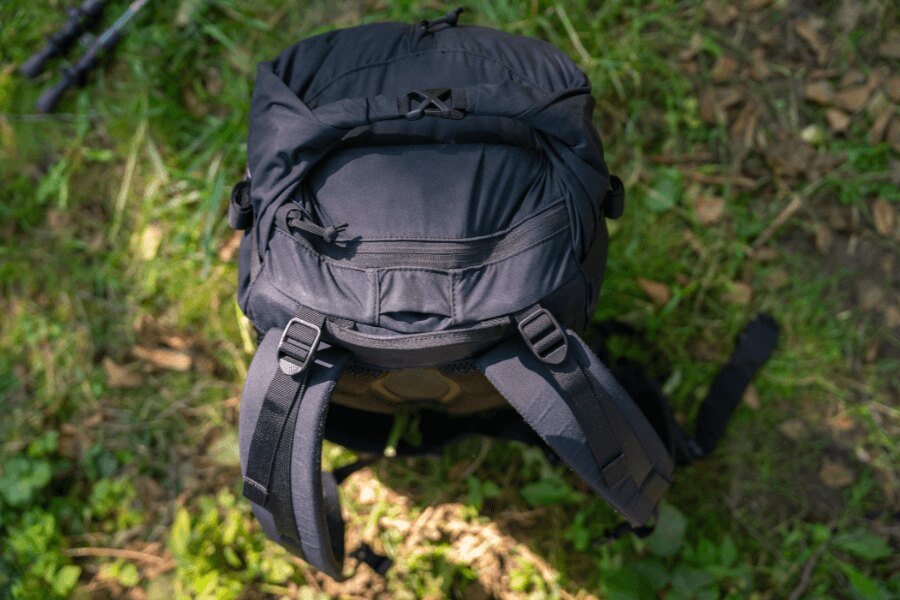
The top side of the Summit Helikon-Tex backpack includes access to the main compartment, a small item pocket, an opening for a tube, and a carrying handle.
Access to the main compartment is sufficiently wide, allowing you to easily get into the backpack. A small pocket for small items provides enough space for a phone, wallet, keys, or anything else of similar size that you don't want to keep in the main compartment.
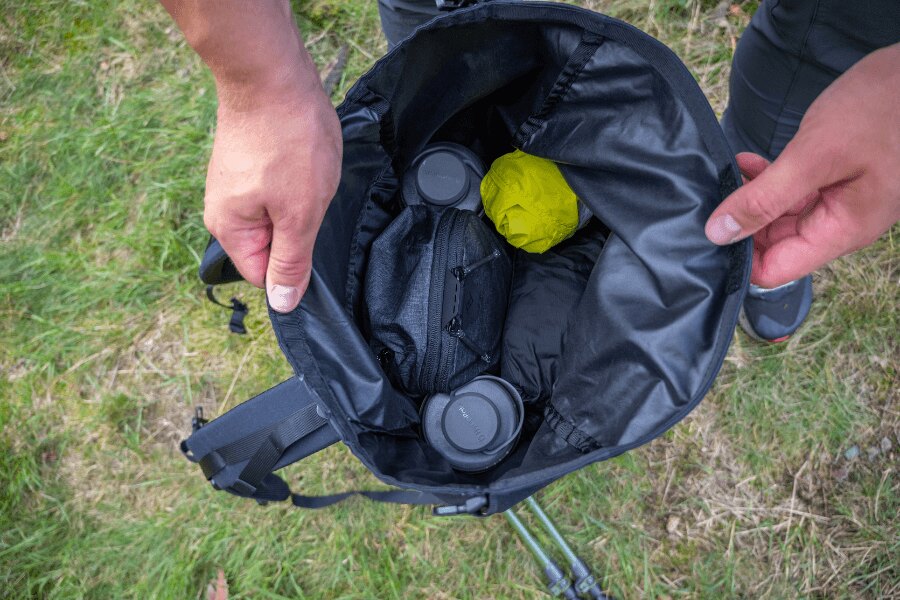
Access to the main compartment of the Summit Helikon-Tex backpack is sufficiently wide.
Rolling closure system of the main compartment might tempt you to carry the backpack by this part. However, I would strongly advise against this, as it would significantly reduce the lifespan of the material. For carrying, use the handle, which is designed for this purpose and has strong stitching.
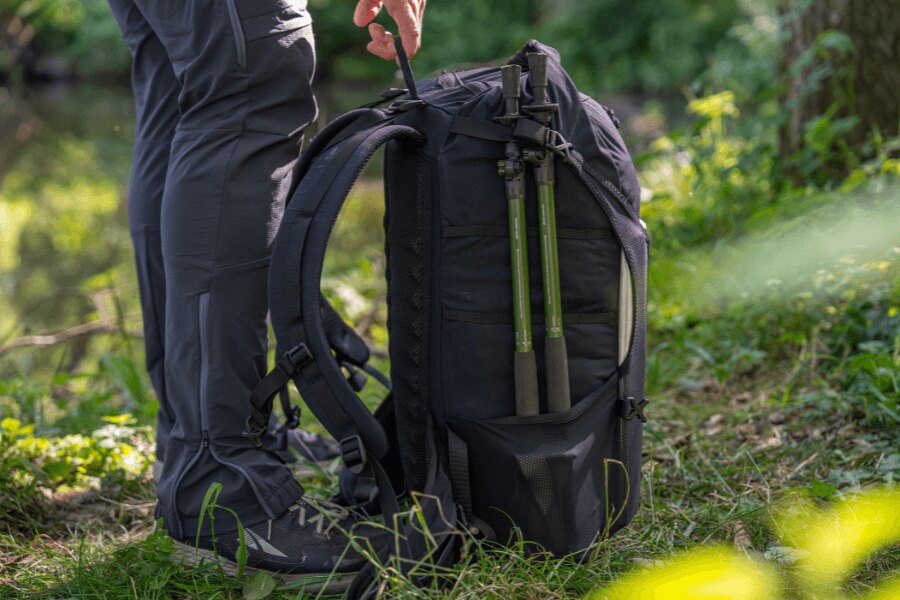
Although there is an option to carry the Summit Helikon-Tex backpack by the closed roll-up, it is better to use the reinforced handle. It is safer.
Bottom side:
The bottom side of the backpack is smooth and you won't find any straps here for attaching a sleeping pad, which are customary with military or hiking backpacks. But I don't see any drawback in that. If I needed to attach something larger to the backpack, the side straps on both sides would be more than sufficient.
The only thing I would appreciate on the bottom part is some moisture protection because I carry a sleeping bag at the bottom of my backpack.
6. Organization - internal part of the backpack
In the main compartment, don't search for much either. There are no internal pockets or divisions. The only things you will find here are a hook for hanging a hydration pack and a Velcro pocket that conceals the previously mentioned foam back padding.
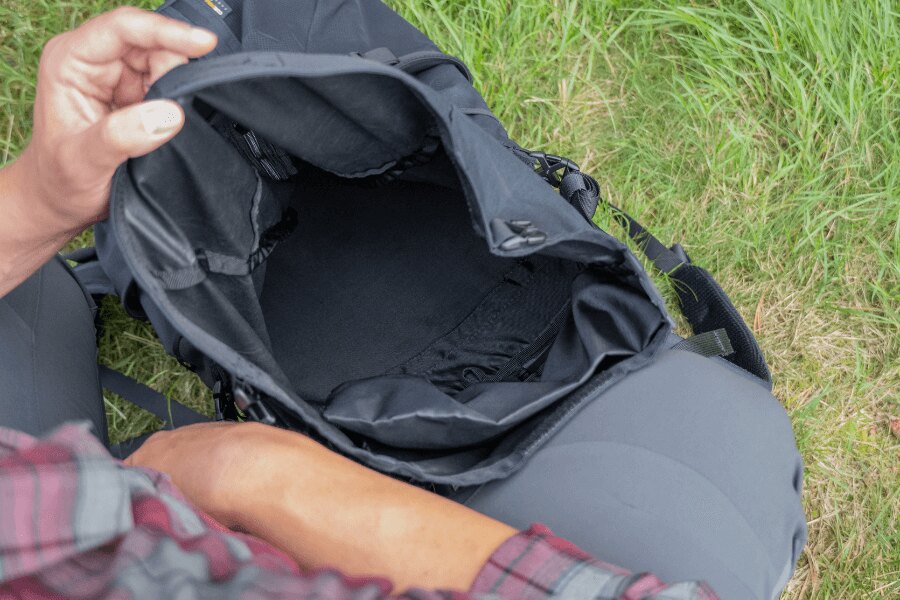
The interior space of the Summit Helikon-Tex backpack is minimally designed.
7. Materials
The Summit backpack weighs an incredible 1,300 grams. It is probably the lightest backpack in its category (considering that it is a product from a military industry manufacturer). The main material is Nylon Cordura. It is quite atypical compared to most of the materials that Helikon uses. If I were to describe it in my own words, it's something similar to what you find in waterproof bags. On the outside, it feels similar to 500 D Cordura, and on the inside, it has a light coating to protect against water.
8. Zippers
Zippers here, as with all products from Helikon, are a safe bet in the form of YKK. And you will find them only in four places (main compartment zipper, small item pocket, and side pockets on the waist belt). They are all of the same design in all places.
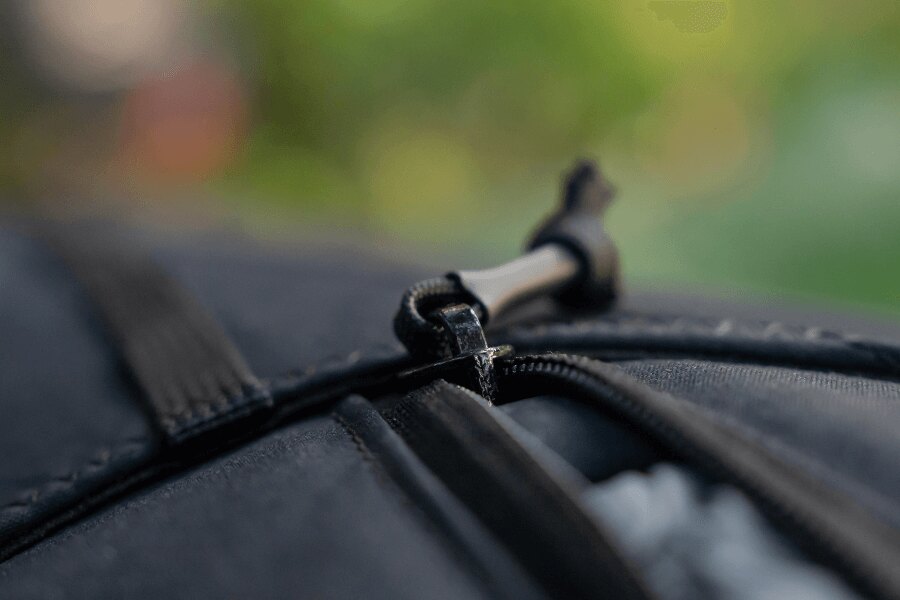
Never underestimate zippers! On the Summit Helikon-Tex backpack, you will find only durable YKK zippers, which means only one thing - a safe bet.
9. Buckles and fasteners
They are represented here again by the quality of the manufacturer Woojin. Compared to other products, Helikon-Tex has made a change in the buckles here. A "more airy" shape resembling the letter X is used here. However, it is just as durable as the classic buckle and is lighter. The advantage of this version is also that it should be more resistant to accidental stepping on. Classic buckles tend to crack immediately in such cases.
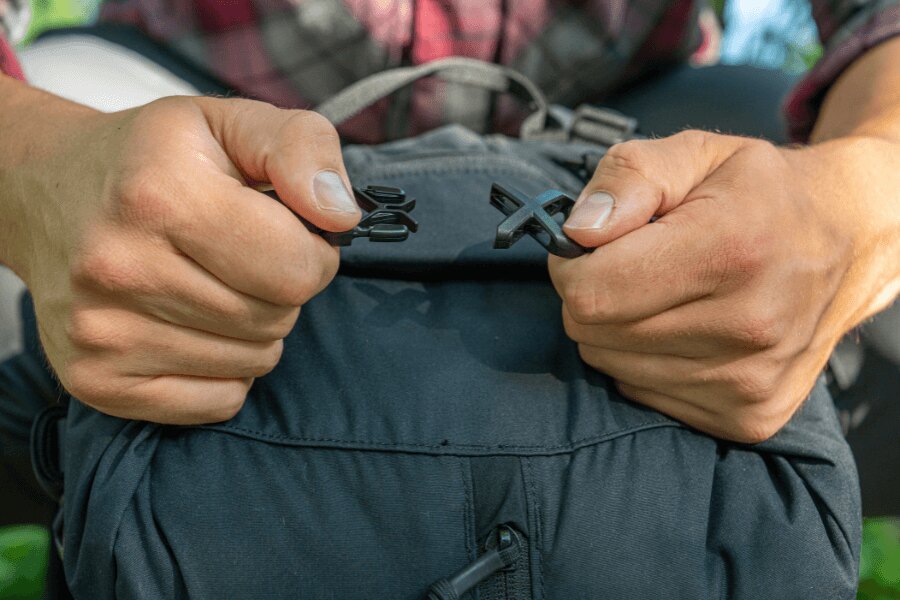
Fastenings on the Summit Helikon-Tex backpack are lightweight, X-shaped.
How did the Summit backpack perform in the field?
Summit met all the criteria I set when choosing and I couldn't wait to test it outside. The day after purchase, I took it to work. We planned a move over a distance of 20 kilometers with a load of at least 20 kilograms and that was the best way to test the backpack.
To be honest, I was quite worried whether it would hold this weight. After all, it is not the classic 500 D Cordura like most military backpacks, but the material withstood it with ease. So, it passed the stress test excellently.
The next question mark was the wearing comfort with such a load. And even that pleasantly surprised me. Previously, I had the tendency to readjust backpacks every now and then because something was pressing or the shoulder straps were cutting into me. But here? Nothing. Throughout the entire transfer, I didn't have to adjust or take the backpack off even once. It fit me perfectly from the first moment. Another test passed with flying colors.
After returning to the barracks, several colleagues gathered around me and started asking about the backpack. They planned to include it in their gear list and use it as a grab bag. They were just not sure if it would be usable for work in our conditions. In the end, it turned out that we placed an order for 8 more pieces in coyote and olive colors that same day.
Today, the Summit is already equipped in more than a third of our unit, and during the time we've been using it for reconnaissance missions, we haven't had a single complaint—except perhaps that it isn't made in multicam :) Thanks to its design, it can be used for various types of tasks that we commonly carry out. And, because it has a smooth outer surface, it fits beautifully into large 120liter backpacks like the mentioned Grab Bag.
Experience from usage
With the backpack, I have walked a little over 100 km outside of work so far, so it still has a lot of testing ahead.
- It is suitable for both long trips, weekend trips and daily use. I have never had a more versatile backpack in all my time.
- It holds a really large amount of things and holds its shape beautifully even if you only fill it halfway.
- I would definitely recommend getting a raincoat. Even though it has a coating on the inside, it is not very friendly with the rain.
What I carry in it
In the photo is my complete gear (without food) for a multi-day stay in nature.
The gear is divided into six parts:
- sleeping,
- clothing,
- water,
- food,
- hygiene,
- accessories.
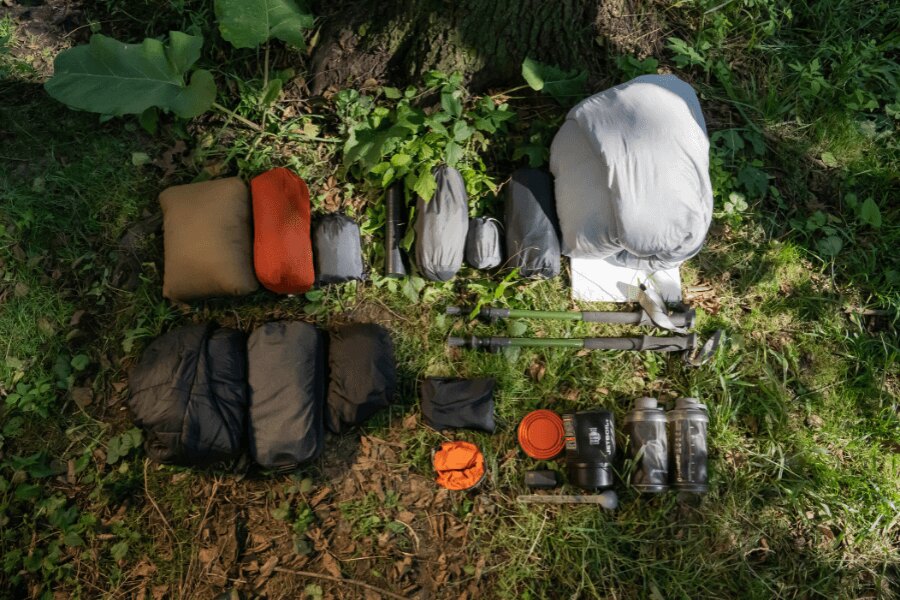
You can pack everything you need for a hike and work into the Helikon-Tex Summit backpack.
Sleeping - hammock, underquilt for the hammock, tarp, stakes for anchoring the tarp, mini hammock for the backpack, inflatable pillow, sleeping bag, inflatable sleeping pad, and groundsheet.
Clothing - spare socks, underwear, and T-shirts (number according to the length of stay), light sweatpants, down jacket, windbreaker, neck warmer, and Skinners sock shoes.
Water - 2x one and a half liter bottles of water (only half the amount is shown in the photo) and a water filter.
Food - depending on the length of stay and location (if there is a shop or restaurant on the way), Jet boil stove, foldable bowl and spoon.
Hygiene - toothbrush, toothpaste, chewing gum, deodorant, wet wipes, tissues, hand sanitizer, medical petroleum jelly, band-aids, and a trash bag.
Accessories - folding knife, rain cover for backpack, outdoor umbrella, trekking poles, mobile phone, wallet, and keys.
I wanted to demonstrate to you what can fit into the Summit, and even though it's quite a lot, there is still enough space. Maybe for food :) The entire set, as shown in the photo, weighs just under 11 kilograms, so I am gradually approaching the weight limit I mentioned above.
Summary
In conclusion, I want to say that the Summit exceeded my expectations. For the price of just under 120 EUR, you get a really great backpack. I looked for some imperfections to write about, but after six months of regular use, I don't have a single complaint about it.
As I wrote in the introduction, if you gravitate towards the same types of backpacks as I do, you are looking for a versatile all-rounder of medium size with low weight and you do not like to leave manufacturers who specialize in equipment for armed forces, then definitely try it - it's worth it. And when the time comes, I will gladly buy it again...
Readers are further interested






































































































































